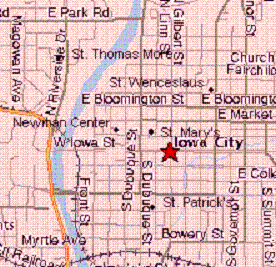
This week, my brother and I, with the help of our beloved parents, are moving to another abode here in Iowa City. Thus, my time online may be curtailed and posts made here could be few and far between.
But take heart and be of good cheer, for as MacArthur once said, "I shall return." In the meantime, I'll leave you all with pictures, links and comments on the five parishes of Iowa City.
The picture on the left here is
St. Mary of the Visitation (the official name, which has been pared down to just St. Mary's) Church here in Iowa City. The church takes its name from the large painting depicting that event contained in the high altar. Father Ken Kuntz has helped me out and St. Mary's is where I go to Mass.
Iowa City has around 60,000 people and has five Catholic churches, including the Newman Center. The unusual thing is that four of the five are all in the same general area and three of the five are within eight blocks of each other.


This second picture is of
St. Patrick's Church. It is one of the three that is closely clustered here in downtown Iowa City. St. Pat's is not far from where I currently live and I can see its steeple from my living room window. The Very Reverend Rudolph Juarez, EV, JCL is the current pastor. The decor is shall we say austere. One reason why I prefer St. Mary's over St. Patrick's is the decor.
Given the fact that liturgy has come to play such a small role for me (all Masses are pretty much silent), the visual is far more important to me these days. I'd prefer to sit/kneel/stand in a church that reaches out to me as Catholic rather than one that would be more at home as a post-Lutherian meeting house in Madgeburg.
 St. Wenceslaus' Church
St. Wenceslaus' Church was the 'Bohemian' church in Iowa City. I've only been to Mass there a couple times. It has a nice altar, but the interior is just kind of bland. The church and its associated buildings are located in a nice neighborhood not far north of Mercy Hospital. Father Michael Phillips is the pastor.
St. Thomas More Church here on the right is the last parish in Iowa City. I've been to a range of Masses at St. Thomas More, including First Communion and Confirmation (for my cousin). The church is located on the west side of the Iowa River close to the University of Iowa's arts campus. Completed in 1966, the 'worship center' seen at the right is an example of a non-traditional design.

The actual 'church' where Mass is held is I think unique that it is wider than it is long (as far as I can tell). St. Thomas More is okay, but personally, I prefer my churches to be brick and mortar rather than steel and concrete. Just my preference (probably why I went with St. Mary's).
Last of all, we come to the
Newman Catholic Student Center, which is located diagonally across the intersection of Jefferson and Clinton from the Pentacrest. The Pentacrest is the group of four buildings that flank Old Capitol (the first capitol building of the State of Iowa).

It's your standard student center, I would suppose. It has a large worship area with chairs rather than pews. Kneeling is optional (be prepared to kneel on the floor if you choose to kneel at all). I don't know Father Ed Fitzpatrick at all, but Catholic students that I know come away with positive experiences and that is the important part.








